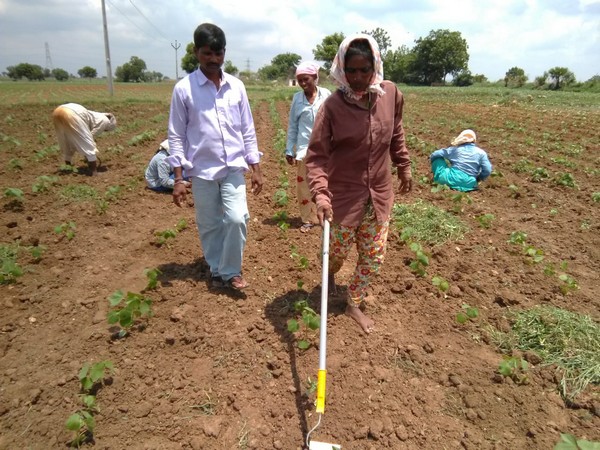Telangana women farmers lead the way to safer agriculture
Farmer Radhika Anishetty, 32, of Narsingana village in Jaishankar Bhupalapally district (erstwhile Warangal district) of Telangana, used to stock at least five cans of harmful pesticides at home for up to three months, to be sprayed periodically on her cotton crops during the sowing season.

- Country:
- India
By Nitin Jugran Bahuguna Farmer Radhika Anishetty, 32, of Narsingana village in Jaishankar Bhupalapally district (erstwhile Warangal district) of Telangana, used to stock at least five cans of harmful pesticides at home for up to three months, to be sprayed periodically on her cotton crops during the sowing season.
"I did not know they were harmful. I would buy them at the local store on the recommendations of the shopkeeper, not realising that with every spray I was exposing myself to toxic, poisonous fumes," she said. And like the other cotton farmers in her village, she would discard the empty pesticide cans along with other garbage. The concept of using protective equipment while preparing and applying pesticides was also unheard of.
But all this changed when Radhika attended a learning group meeting organised in the village for women farmers. She learned that adopting better cotton cultivating practices will not only improve the soil and yields but also enhance her family's health and improve the environment around her. Radhika was taught how to make waste decomposer and to apply this preparation to her saplings with an implement called stem applicator. "By stem application method, we use less of pesticides. Earlier, I used regular sprays at least three times during the season but now with the applicator, I have reduced pesticide use by 30 to 40 per cent," she said.
The learning group is part of the Better Cotton Initiative (BCI) project being implemented by Modern Architects for Rural India (MARI), a Warangal- based NGO, with financial and technical support from Worldwide Fund for Nature India (WWF India). The BCI project was launched in 2012 in erstwhile Warangal district to promote best management practices among farmers in cotton cultivation so as give them access to improved markets and better profitability as well as to protect the environmental and healthy living standards of the farming community.
The project, which was extended in April last year till March 2021, focusses on integrated pest management (IPM) and reducing the use of harmful pesticides in cotton farming. IPM is a sustainable approach to managing pests in cotton crops by combining biological, cultural, physical and chemical tools in a way that minimises economic, health and environmental risks, said Arogyaraj David, a project coordinator at MARI. "Pesticide injuries are most likely to occur while chemicals are being mixed and people who work with pesticides tend to be less safety-conscious when they are mixing pesticides," he said. "Spraying of pesticides must be done in appropriate weather conditions and by workers over 18 years and above, wearing personal protective equipment."
After spraying, the pesticide containers must be stored in a safe place out of the reach of children or dumped in the earth or burnt or recycled in an appropriate manner, he added. K Saraswati, 45, of the same village, has learned how to prepare bio-friendly waste decomposer which can be applied to the saplings with the stem applicator. "I have prepared the waste decomposer solution comprising cow dung and jaggery. A few friendly bacteria, which I received from the project, was also added to the solution which I then applied periodically on my saplings," she said.
"Even in dry conditions, this decomposer will sustain the saplings and I have drastically reduced the use of harmful pesticides." T Sujatha, 34, as a field facilitator in the project, has been educating farmers on the benefits of applying farmyard manure and organic extracts to enhance soil fertility as well as the importance of weeding and IPM techniques. "I have been working with 569 farmers in 15 learning groups in four villages for the past 12 years," she said.
Farmers like Radhika and Sujatha have eagerly absorbed the field facilitator's inputs given at the women's leaning group meetings which include IPM techniques like pheromone traps and sticky plates, besides identifying the variety of pests in the cotton fields. So far, about 4,000 farmers are involved in the project and are receiving information and training in 118 learning groups on how to enhance and maintain soil fertility by fertiliser application and using previous harvest's crop stubble into the soil which serves as manure.
The safe disposal of pesticide containers is promoted to avoid pesticide contamination in water bodies. Chemicals used to control pests are harmful and target species including people, livestock, pets, fish and wildlife. As a pesticide user, farmers have to use permitted pesticides to reduce these risks.
"We are getting vital information on new formulations of pesticides which are permitted under the BCI guidelines and which we can safely use taking all necessary precautions," said Radhika. "With less harmful chemicals sprayed on our lands, we can see the difference in our soil, our crops and on our health," she added.
About the writer: Nitin Jugran Bahuguna is a freelance journalist with over 30 years of work experience. She is currently working as Communications Adviser with Worldwide Fund for Nature India (WWF India). Views expressed here are of the writer. (ANI)
(This story has not been edited by Devdiscourse staff and is auto-generated from a syndicated feed.)
- READ MORE ON:
- Warangal district
- Telangana
- WWF India
- NGO










